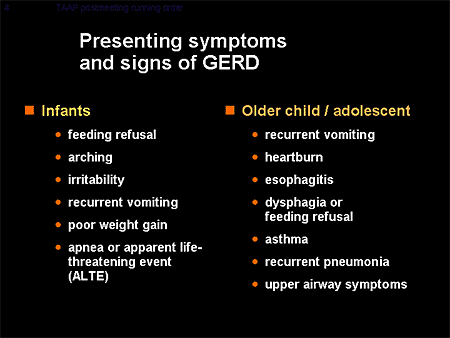
Symptoms & Signs -

Heartburn is an uncomfortable feeling of burning and warmth behind the breastbone (sternum) but sometimes rising as high as the neck. It usually occurs after meals, when lying down, or at night while sleeping.
Heartburn usually is due to gastroesophageal reflux disease (GERD), the rise of stomach acid back up into the esophagus. Heartburn has nothing whatsoever to do with the heart though the discomfort of heartburn may be confused with heart pain and vice versa. Heartburn is a popular nonmedical term that often is referred to medically as pyrosis.
These are simple tips you can follow that will help you prevent heartburn--
# Eat smaller, more frequent meals.
A full stomach can put extra pressure on the lower esophageal sphincter (LES), which will increase the chance that some of this food will reflux into the esophagus.
# Limit your intake of acid-stimulating foods and beverages.
Eat foods that rarely cause heartburn and avoid those foods that will often cause heartburn.
# Don't eat within two to three hours before bedtime.
Lying down with a full stomach can cause stomach contents to press harder against the LES, increasing the chances of refluxed food.
# Elevate your head a few inches while you sleep.
Lying down flat presses the stomach's contents against the LES. With the head higher than the stomach, gravity helps reduce this pressure. You can elevate your head in a couple of ways. You can place bricks, blocks or anything that's sturdy securely under the legs at the head of your bed. You can also use a wedge-shaped pillow, to elevate your head. Read this article for more tips on easing nighttime heartburn.
# Maintain a reasonable weight.
Obesity increases abdominal pressure, which can then push stomach contents up into the esophagus. According to some statistics, approximately 35 of overweight persons experience heartburn. The good news is that for many people, as little as a 10 percent decreasee in weight will improve their heartburn symptoms.
# Don't wear belts or clothes that are tight fitting around the waist.
Clothing that fits tightly around the abdomen will squeeze the stomach, forcing food up against the LES, and cause food to reflux into the esophagus. Clothing that can cause problems include tight-fitting belts and slenderizing undergarments.
# Don't smoke.
Nicotine relaxes the esophageal sphincter. Smoking also stimulates the production of stomach acid. Read this article to learn other ways smoking can worsen heartburn.
# Relax.
While stress hasn't been linked directly to heartburn, it is known that it can lead to behaviors that can trigger heartburn. Follow these relaxation tips to alleviate stress, and thus make stress-related heartburn less likely.
# Keep a heartburn record.
Record what triggered your acid reflux episodes, the severity of each episode, how your body reacts, and what gives you relief. The next step is to take this information to your doctor so the both of you can determine what lifestyle changes you will need to make and what treatments will give you maximum relief. To get you started, you can use this Heartburn Record.
# Don't drink alcohol.
If you still want to drink alcoholic beverages, follow these tips.
Tips:
1. Use these charts to learn what foods are safe to eat, what foods you should eat in moderation, and what foods you should avoid when planning your acid reflux diet.
2. Before you eat out at a restaurant, learn what foods you can eat that have little risk of causing heartburn. You can see what these foods are with this safe foods chart.
3. Check out these 10 Most Common Treatment Options For Heartburn / Acid Reflux When you suffer from chronic heartburn, whether it's caused by gastroesophageal reflux disease (GERD) or some other digestive disorder, it's important to know how to treat the heartburn. Untreated acid reflux may lead to complications, including esophageal cancer.
4. Take your medication at the same time every day. If you take medication to treat your heartburn, it is very important to take your medication every day. If you are prone to forgetting, leave yourself a note to remind you or take your medication when you do another daily activity that you don't forget doing, such as brushing your teeth or washing your face.
=================== 000 ===================

0 Comments